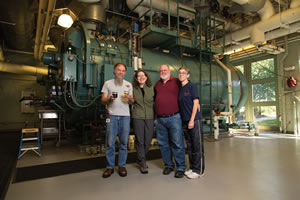Heating With (Vegetable) Oil

PHOTO COURTESY OF KEENE STATE COLLEGE
KEENE STATE physical plant staff David Weeks, Cary Gaunt, Bill Rymes and Diana Duffy.
Keene State College is a public liberal arts
college in New Hampshire that has established a
commitment to sustainability as a core value. From
building and facilities, the college recently announced that it is the
first, and currently only, college or university in the U.S. to heat a
college campus with 100 percent purified waste vegetable oil. The
announcement was made in October, which was Campus Sustainability
Month — an international celebration of sustainability in
higher education.
Locally Sourced
The biofuel is a product of a proprietary refinement process
used by a New England-based producer. The purified waste vegetable
oil is carbon neutral and currently heats 36 percent of the
college campus. Keene State intends to grow the use of the biofuel
to heat more of the campus over the coming years, as it is a vital
part of attaining the college’s sustainability and climate commitments,
in addition to cultivating a more diversified and resilient
heating fuel portfolio. During August 2016, Keene State met the
demand for heat and hot water entirely through the use of purified
waste vegetable oil.
“Sustainability is a core value at Keene State College — in
fact, the college was one of the original signatories of the
American College and University President’s Climate Commitment,
now titled the Carbon Commitment. The college continues
to develop projects and an overall plan to significantly reduce
greenhouse gas emissions campus-wide,” says Keene State
College Director of Campus Sustainability Cary Gaunt. “After
checking with industry leaders, we have found that Keene State is
the only college or university to use purified waste vegetable oil
to heat a campus. By choosing to replace polluting No. 6 heating
fuel oil with an innovative new fuel derived entirely from waste
cooking oil, we are taking bold steps to demonstrate our values
by significantly reducing our greenhouse gas footprint and
improving the well being of the people on our campus and the
surrounding community.”
National Recognition
“Keene State College’s decision to switch their heating fuel to
100 percent used cooking oil is an innovative example of reducing
operational greenhouse gas emissions, supporting a local
business and improving the air quality around their campus. It’s
also a testament to the many benefits of working toward the goal
of carbon neutrality,” says Second Nature Senior Manager Steve
Muzzy, whose organization works with colleges and universities to
advance principles of sustainability in higher education.
The waste vegetable oil, with renewable energy incentives,
offers a cost that is comparable to the No. 6 fuel oil that the college
was using for most of its heating needs. Minimal upfront cost and
staff time were necessary to begin using the waste vegetable oilderived
biofuel, and the environmental benefits are significant
for the campus and the greater Keene area. In addition to using
vegetable oil for fuel, Keene State is making plans for its own used
cooking oil to be recycled for use as heating oil.
“I feel a great sense of pride being a part of a community that
is actively searching for ways to reduce their carbon footprint. The
progress that is being made shows the dedication and concern that
Keene State has for our planet,” says Keene State College environmental
studies major and Eco-Rep Victoria Drake. ”The switch to
purified waste cooking oil demonstrates how our campus strives
to support just one of their many values. This step forward proves
our commitment to sustainability, and I hope that it serves an
example for other colleges and universities as well.”
This article originally appeared in the issue of .